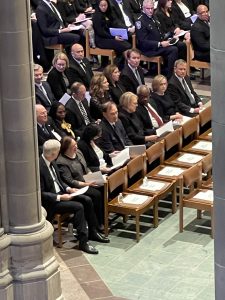IN MEMORIAM
A Washington send-off for Sandra Day O’Connor

on Dec 19, 2023 at 5:02 pm
The late Justice Sandra Day O’Connor was celebrated at a memorial service Tuesday as an American pioneer whose mantra when facing legal decisions and life challenges was “get it done.”
“Sandra Day O’Connor, the daughter of the American west, was a pioneer in her own right, breaking down the barriers in the political world and the nation’s conscience,” President Joe Biden said during a two-hour service at Washington National Cathedral. “To her, the Supreme Court was the bedrock, the bedrock of America. It was the vital line of defense, devoted not to pursue power for power’s sake but to make real … the American promise that holds that we are all created equal and deserve to be treated equally throughout our lives.”
Chief Justice John Roberts said, “In nearly a quarter-century on the court she was a strong, influential, iconic jurist. Her leadership shaped the legal profession, making it obvious that judges are both women and men.”
O’Connor, who died Dec. 1 at age 93, regularly attended services at the Episcopal cathedral, and she served eight years on its governing board, the Very Rev. Randolph Marshall Hollerith, the dean of the cathedral, said in welcoming a large audience. In 2004, Hollerith pointed out, O’Connor had participated in the funeral at the cathedral of President Ronald Reagan, who had nominated her in 1981 as the first woman on the Supreme Court.
Among those in attendance were all nine sitting members of the court, plus retired Justice Anthony M. Kennedy. Senior members of the court’s staff, O’Connor’s law clerks, veterans of the Reagan administration, lawyers from the U.S. solicitor general’s office, and at least three former U.S. attorneys general—Alberto Gonzales, who served under President George W. Bush; and Eric Holder and Loretta Lynch, who served under President Barack Obama.

The Justices of the Supreme Court at the National Cathedral for the funeral of Retired Justice Sandra Day O’Connor (Mark Walsh)
Roberts related some personal interactions with O’Connor that went back to the time of her confirmation.
“It was my first day in a new job at the Justice Department, and I was proud to be part of her team,” the chief justice said. “I thought our group did a pretty good job. After all, the justice was confirmed 99 to nothing and we must’ve had something to do with that. Only many years later was I told that she thought I had been slow in getting material to her. I should have learned that when she had a challenge or responsibility before her, her approach was simple and direct—get it done.”
Years later, after Roberts had been initially nominated by George W. Bush to succeed her when she announced her retirement, Roberts said she seemed a little put out that he did not commit to hiring her law clerks, though Roberts felt he should at least wait until he was confirmed before addressing that issue.
And when Chief Justice William H. Rehnquist died in Sept. 2005, Bush nominated Roberts for that position, and O’Connor remained on the court until her successor (Samuel Alito) was confirmed in Jan. 2006.
“She and I were discussing a case in chambers, and I think she grew tired of my ‘on the one hand and the other hand’ [approach]. She got up and said, ‘You just have to decide.’ There was impatience in her voice, but I don’t think it was entirely due to me. She had made her own decision about the future and announced her retirement six months earlier. I think she was anxious to get it done.”
Biden recalled that he was the ranking member of the Senate Judiciary Committee when O’Connor appeared for her confirmation hearing “on a Wednesday in September 1981.”
O’Connor was “gracious, wise, civil and principled,” Biden said.
She helped “open doors, secure freedom, and prove that a woman can do anything a man can do but, many times, do it a hell of a lot – a heck of a lot better,” the president said to laughter.
In her homily, the Right Reverend Mariann Edgar Budde, the Episcopal bishop of Washington, said that O’Connor was a realization of dreams for generations of women who came before her and an inspiration for those who came after.
As the first female justice, Budde said, O’Connor “held that space with such grace and dignity, recognizing the power and importance of standing in that gap between dreams denied and dreams realized. She also lived long enough to see some of her influence wane. She had to make her peace with that too, which was not easy.”
Jay O’Connor, the youngest of Sandra and the late John O’Connor’s three sons, spoke of his mother trying to set him up on a date with a young woman who had recently fallen off a horse and was in a body cast.
“In her mind, this was a pragmatic solution to the problem of a son she loved without a nice wife,” O’Connor said. He said that his parents had loved to dance and that his mother was known as one of the best dancers in Washington. And he revealed that his parents had taken disco dance lessons in Arizona in the late 1970s. He then conducted an impromptu survey.
“A quick survey of the justices of the Supreme Court with us today, raise your hand if you have received technical training in disco dancing,” O’Connor said. None raised his or her hand.“That is what I thought,” he said. “My mom is the first person on the Supreme Court with technical training in disco dancing.”
Even a motherly maxim of “Don’t hit your brother!” O’Connor said, translated to his mother’s service on the high court.
“‘Don’t hit your brother’ was the first lesson in her own philosophy she taught us over time, to not lash out at anyone, even your opponent,” he said. “Treat everyone with kindness and respect. This approach allowed her to navigate every situation with grace.”
The youngest son said O’Connor had written a letter to her sons 36 years ago and sealed it, not to be open until near the end of her life. The letter included her funeral and burial wishes, he said.
“It won’t surprise you to know that we are following her instructions here today to a T,” he said.
“So, now that she has completed the circle, her family will take her remains back to her beloved Lazy B Ranch, back to Round Mountain, where she can hear the two giant windmills creak in the wind, and where she learned how to see forever across the high, open desert. Back to the sacred place where her extraordinary life began.”
Among Sandra Day O’Connor’s wishes for her funeral program were such hymns as “Rock of Ages,” “Amazing Grace,” and a rousing rendition of “America the Beautiful” to close the service.
(Correction 7:31 p.m. Eastern: This post was updated to correct the language used by the president.)


